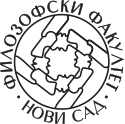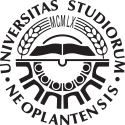15MKMK045 - Hungarian Literature after Modernism
| Course specification | ||||
|---|---|---|---|---|
| Course title | Hungarian Literature after Modernism | |||
| Acronym | 15MKMK045 | |||
| Study programme | Hungarian language and literature | |||
| Module | ||||
| Type of study | first degree undergraduate academic studies | |||
| Lecturer (for classes) | ||||
| Lecturer/Associate (for practice) | ||||
| Lecturer/Associate (for OTC) | ||||
| ESPB | 6.0 | Status | ||
| Condition | - | Oblik uslovljenosti | ||
| The goal | Study of the history, creation, discourse, and significant works of Hungarian literature, from the mid - 20th century. Historical avant – garde and the so-called second wave of modernism in the twenties and thirties. | |||
| The outcome | The students are introduced to the trends and discourses in Hungarian literature during the indicated time period, along with the significant life works and representative literary works in the period of historical avant – garde and modernism that followed it. | |||
| Contents | ||||
| Contents of lectures | Historical avant – garde in the European and Hungarian contexts (Lajos Kassák and Tibor Déry). The poetics of modernism after avant – garde, in Hungarian poetry. A synthesis of the literary paradigms in some lyrical works. Nyugat journal tradition, subsequent avant – garde and populist – national trends (poetry of Lőrinc Szabó, Attila József, Miklós Radnóti, and Gyula Illyés). | |||
| Contents of exercises | The students are introduced to literary texts from the covered time period; study and analysis of texts. | |||
| Literature | ||||
| ||||
| Number of hours per week during the semester/trimester/year | ||||
| Lectures | Exercises | OTC | Study and Research | Other classes |
| 2 | 2 | |||
| Methods of teaching | A presentation of teaching material along with the students’ active participation. Description of the indicated literary and artistic trends and phenomena. Overview of their presence in certain poetry and literary works. Practical work encompasses the development of dialogue with the students, interpretation and analysis of concrete texts. Development of the students’ written and oral expression skills in the interpretation and analysis of texts. | |||
| Knowledge score (maximum points 100) | ||||
| Pre obligations | Points | Final exam | Points | |
| Activites during lectures | 5 | Test paper | 30 | |
| Practical lessons | 25 | Oral examination | 30 | |
| Projects | ||||
| Colloquia | 10 | |||
| Seminars | ||||

